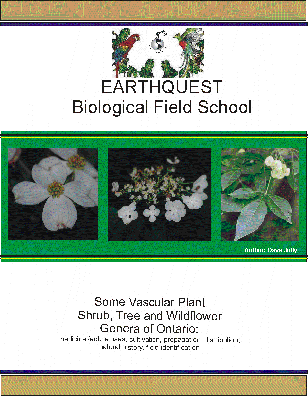
|
In order to qualify for internships through the Biological Field School and become full time students must enroll in a minimum of 3 courses. Students who simply enroll in 1 course will not be considered. This will allow an instructor to work with you to improve your resume, cover letter, provide job finding strategies. It also places you on the list to receive weekly job postings so that you may start applying to suitable jobs immediately. Please choose from the following list of courses. If you wish to discuss courses with an instructor please contact us;
Core General FAT Program courses
i. Hullet Provincial Wildlife Area, Clinton, Ontario
The following employers have hired graduates of this course;
i. Upper Thames River Conservation Authority
Here's what professionals have to say about our courses;
"In my experience, graduates from Earthquest Canada are well qualified to participate in consulting practices and the market is currently in short supply of well-qualified individuals. I am most familiar with wetland delineation, Ecological Land Classification, and bird identification coursework put forth by Earthquest. I have sent some of my professional biologist staff for coursework at Earthquest and was very happy with the improvement of the professional skills of program participants."
Avalon Consulting Professionals
This course focuses on combining the concepts of hydrology, soil science, forestry, geology and biotic factors to classify natural areas. Students will spend 20 - 30 hours learning how to identify soil types, how water flows, applying plant field ID skills and recognising vegetation communities. The course will utilize soil labs and field practicums to reinforce concepts learned. The culmination will be a student project on classifying a natural area. This project will be submitted in written and oral format.
In 2010 the ELC certification course will be offered on the following date;
Spring semester - 4 week version (each day is the equivalent of 1 week from 4 week version)
April April 26 - May 21, 2010. Book early to avoid disappointment as this course fills quickly.
Five day version: April 26 - 30, 2010
Cost
$1300.00 CAD + $40.00 (ELC field manual) + $100.00 (Plant Genera of Ontario) = $1440.00 CAD Total
This course is recognized by the Ontario Ministry of Training, Colleges and Universities and focuses heavily on plant field ID and mapping.
A typical schedule in this course might resemble the schedule below;
During the summer 2010 semester the Wetland evaluation certification course will be offered on the following dates;
Spring semester - 5 day version (each day is the equivalent of 1 week from 4 week version)
May 31 - June 25, 2010. Book early to avoid disappointment.
Cost
$1200.00 CAD + $100.00 (Aquatic/wetland plant genera of Ontario) = $1300.00 CAD Total
Once you have completed your training you may apply to any position which requires Wetland work. Benefits of training
Both the Wetland studies and principles and concepts of ELC courses must be taken by attending field sessions at our Biological Field School for 7 to 35 hours per week for up to 4 weeks. If you can't find that much time you may request to enroll in the 2 or 5 day intensive field practicums. Only a limited number of spaces are available to participate in 2 or 5 day field practicums, so it is strongly recommended that you reserve your spot before somebody else grabs it! Generally, 2 day field practicums run over a weekend on a Saturday and Sunday, while 5 day field practicums run from Monday to Friday. It is recommended to do your 2 day field practicum during our Bruce Trail Project mini course since all students are assessed for job readiness on this course and a full time paid internship or contract position may be attached directly to the course. Please email or phone to inquire about availability of spots in this course. Due to the popularity of the ELC & Wetland certification courses we can only accept applications on a first come, first pay basis and we cannot reserve spaces or place your name on the waiting list until full payment is received.
To learn more about the Bruce Trail Project mini course please consult;
Bruce Trail Project mini course
Once you have completed your training you may apply to any position which requires ELC &/or Wetland work. Benefits of training
*Note*: Our ELC & Wetland courses are similar to the MNR versions, but are not to be misconstrued, interpreted or confused with the MNR versions. We focus more heavily on vegetation and mapping. All EARTHQUEST courses and programs are subject to change and recognized by the Ontario Ministry of Training, Colleges and Universities.
$27.50 CAD + shipping and handling 
Photo: Dave Jolly for more information please click on;
D. Jolly, B.Sc.
| ||||||||||||||||||||||||||||||||||||||||||||||||||||||||||||||||||||||||

